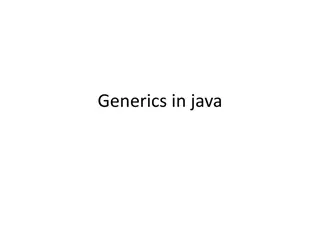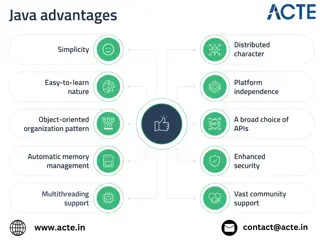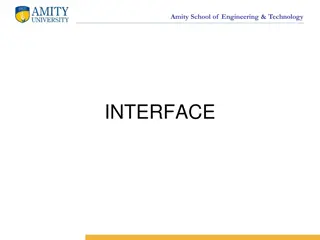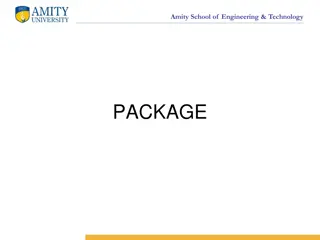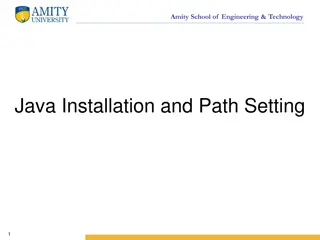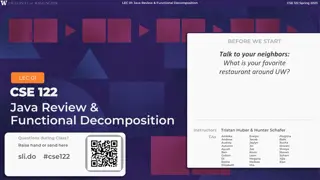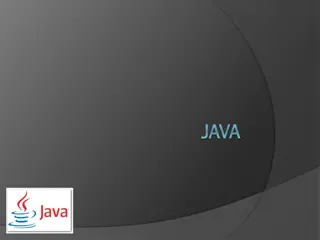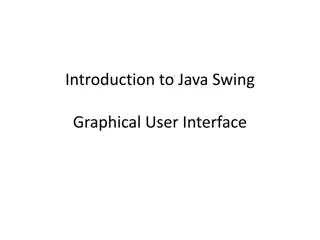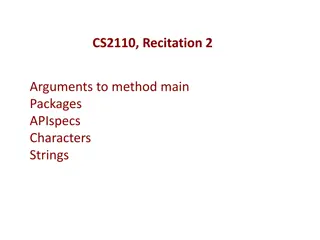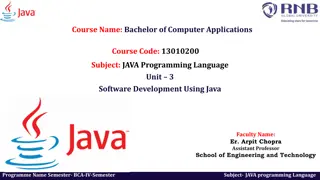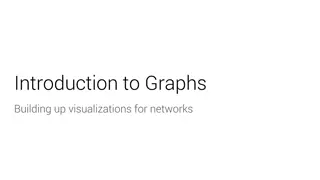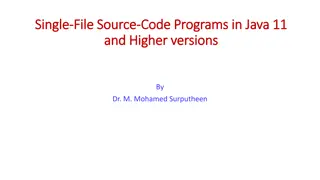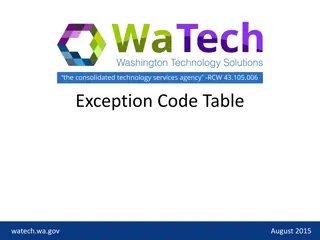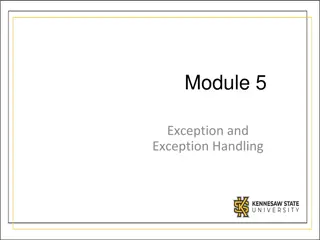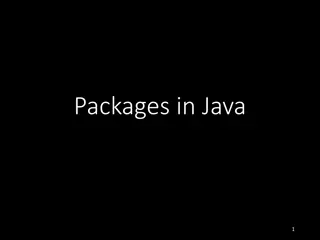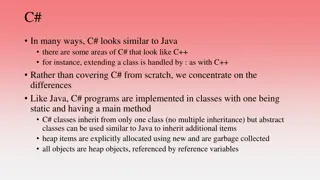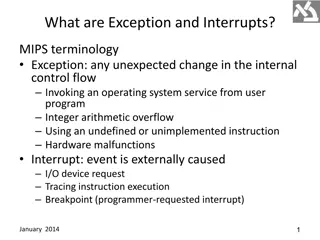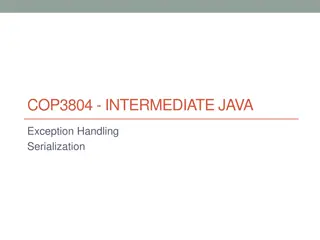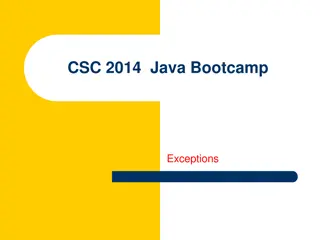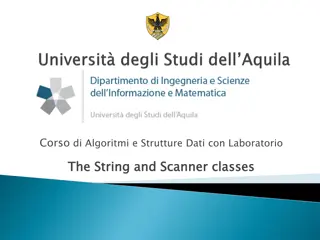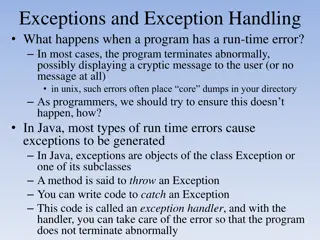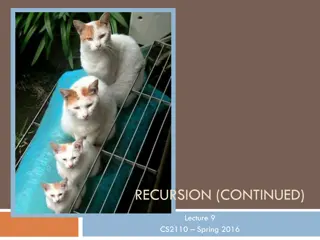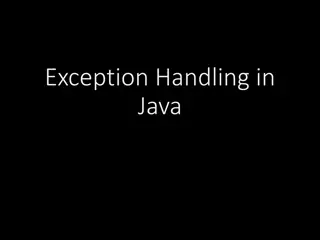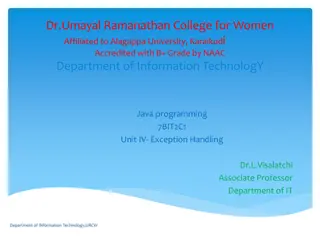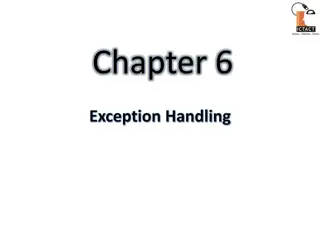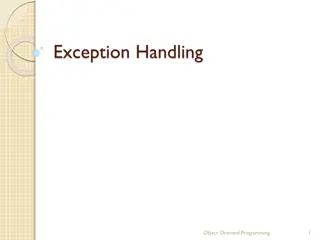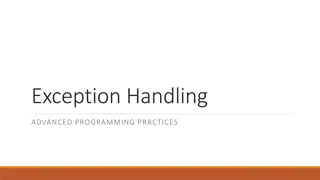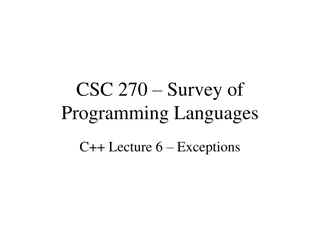Java application development company (1)
In today's digital landscape, Java remains a cornerstone technology for building robust, scalable, and secure applications. Java's versatility, platform independence, and extensive ecosystem have made it a popular choice for organizations across various industries. Java application development compa
2 views • 4 slides
Understanding Generics in Java
Generics in Java allow for parameterized types, enabling the use of different data types in classes, interfaces, and methods. By creating generic entities, such as classes that work with various data types, Java programmers can write more flexible and reusable code. This concept is demonstrated thro
0 views • 16 slides
Understanding Java: The Backbone of Cross-Platform Development
Java stands as a cornerstone in the realm of programming languages, revered for its versatility and robustness. Enrolling in a Java Course in Pune significantly enhances one\u2019s ability to leverage Java\u2019s capabilities effectively. Understandi
1 views • 1 slides
Understanding Java Interfaces in Amity School of Engineering & Technology
Java interfaces are a key concept in object-oriented programming that allows for achieving multiple inheritance. The article discusses how Java interfaces work, their role in defining class behavior, and the differences between interfaces and classes. It also explains the syntax for declaring interf
2 views • 48 slides
KDADS IDD Crisis Exception Training Overview
This document provides an overview of the KDADS IDD Crisis Exception Training held on October 28, 2020. It includes information on the agenda, purpose of the training, review of the current process, and policies related to crisis exceptions in IDD programs. The training aimed to streamline the crisi
1 views • 16 slides
Understanding Java Packages and Their Importance in Programming
An exploration of Java packages, their role in structuring code, organizing classes, and enhancing code reusability. Learn about built-in and user-defined packages, the Java API's package organization, and the different types of packages available in Java programming. Discover how packages help in c
2 views • 18 slides
Amity School of Engineering & Technology Java Installation Guide
In this detailed guide provided by Amity School of Engineering & Technology, learn how to install and set up Java on your system effectively. The step-by-step instructions cover downloading the Java installer, configuring the installation wizard, setting environmental variables, and more to ensure a
1 views • 19 slides
Proposal NPRR.1144: Station Backup Power Requirements Exception
NPRR.1144 proposes an exception allowing up to 500kW of auxiliary load to connect to a Transmission/Distribution Service Provider's facilities through a separately metered point using an emergency load transfer switch. This exception aims to provide flexibility in redundant power supply options for
0 views • 4 slides
Java Review & Functional Decomposition in CSE 122 Spring 2023
Lecture 01 in CSE 122 covers Java review, functional decomposition, and code quality. Announcements include a Java review session, programming assignments, and reminders on Java syntax. The session encourages active participation through in-class activities using Slido polls. Students are also urged
0 views • 24 slides
Understanding Interactive Programs and Input/Output in Java
Interactive programs in Java allow users to input data through the console, which can be captured and used in the program. This involves using the Scanner class to read user input, and understanding common Scanner methods to process different types of input. Importing Java class libraries is essenti
2 views • 15 slides
Learning Swing with Java Foundation Classes (JFC) and Swing
Java Foundation Classes (JFC) and Swing provide a powerful set of tools for building graphical user interfaces in Java applications. This includes Swing GUI components, pluggable look-and-feel support, accessibility APIs, Java 2D graphics, and internationalization capabilities. By learning Swing wit
1 views • 11 slides
Understanding Java Swing for Building Graphical User Interfaces
Java Swing is a powerful framework for creating graphical user interface applications in Java. It provides a wide array of visual components such as JFrame, JComponent, and JPanel, enabling developers to build interactive and visually appealing applications easily. With Swing, developers can design
1 views • 25 slides
Java Application Development Basics
Learn how to create a Java application with a main method using Eclipse. Understand the concept of method parameters and how to provide arguments when running the application through Eclipse's Run Configurations feature. Explore the structure of packages in Java and the Java API.
0 views • 26 slides
Understanding Java Programming: BCA IV Semester Course Overview
This Bachelor of Computer Applications (BCA) course focuses on Java programming language fundamentals, object-oriented concepts, software development principles, and practical application skills. Students will learn to define Java program features, implement object-oriented features, work with array
0 views • 31 slides
Exploring Graphs: Visualizations and Representations in Java
Delve into the world of graphs with a focus on visualizations for networks and building up graph representations in Java. Explore different graph representations, adjacency lists, and key-value mappings, along with insights on storing and tracking data efficiently using Java data structures. Dive in
0 views • 12 slides
Understanding Single-File Source Code Programs in Java 11
Explore the concept of single-file source code programs in Java 11, where the entire program is contained within a single .java file without external dependencies. Learn how to compile and run these programs both before and after Java 11, and discover the new feature of executing Java programs direc
0 views • 11 slides
Exception Code Table - Overview and Navigation
Learn about the Exception Code Table on Watech.wa.gov created for processing various types of payments. Discover the reasons behind its creation and how to navigate to access the codes. Explore the available Exception Codes and their structures in this informative guide.
0 views • 24 slides
Understanding the Fiduciary Duty Exception to Attorney-Client Privilege
Several courts have deliberated on extending attorney-client privilege to protect communications between law firms' in-house counsel seeking advice on handling potential malpractice claims. This exception, known as the fiduciary duty exception, has faced scrutiny and rejection in recent cases, safeg
0 views • 36 slides
Understanding Exception Handling in Java
Exception handling in Java is essential for dealing with potential problems that may arise during program execution. By implementing try-catch-finally blocks and throwing custom exceptions, developers can create more robust and secure applications. This article explores the basics of exceptions, the
0 views • 36 slides
Understanding Packages in Java: A Comprehensive Overview
Packages in Java play a crucial role in organizing and structuring code for efficient reuse and maintenance. They allow you to group related classes together, provide encapsulation, and facilitate code organization. This article dives into the basics of Java packages, advantages they offer, differen
0 views • 19 slides
Java Overview and Basics: Understanding the Fundamentals of Java Programming
Java is a versatile programming language known for its simplicity, security, portability, and high performance. Its history dates back to 1990 when the concept was first suggested, leading to the creation of Java in 1995 by James Gosling. Over the years, Java has evolved with various versions introd
0 views • 65 slides
Overview of Java Programming Language
Java is a versatile and powerful programming language created by James Gosling and others at Sun Microsystems in the 1990s. It aims for portability, reliability, safety, simplicity, and efficiency. With a strong focus on object-oriented programming, Java has evolved over the years with a rich histor
0 views • 33 slides
Mastering Generics in Effective Java: A Practical Guide for Java Programmers
Explore the world of generics in Java through Joshua Bloch's guidance in "Effective Java". Learn the importance of avoiding raw types, leveraging parameterized types for type safety, handling mixing of generic and raw types, and implementing wildcards for flexible and typesafe coding. Enhance your J
0 views • 30 slides
Differences Between C# and Java: A Comparative Overview
C# and Java share similarities in syntax and features, but there are key distinctions that set them apart. From class inheritance to memory management, this comparison highlights the unique aspects of C# programming. Explore how C# diverges from Java in terms of multiple inheritance, explicit heap a
0 views • 16 slides
Exception Handling and Interrupts in MIPS Architectures
Exception and interrupts in MIPS play a crucial role in handling unexpected events and external requests efficiently. Exceptions include changes in control flow, arithmetic overflows, and hardware malfunctions, while interrupts are externally caused events like I/O requests. When an exception occurs
1 views • 29 slides
Understanding Exception Handling in Intermediate Java
Exception handling is crucial in Java programming to manage errors and unexpected events that can disrupt program execution. This article covers the basics of exceptions, throwing and handling exceptions, types of exceptions (checked and unchecked), and use of try, catch, and finally blocks. Learn h
0 views • 11 slides
Exception Handling in Java: Understanding and Implementing
Exceptions are unforeseen occurrences in a program, representing errors or unusual situations. Java provides exception handling mechanisms to gracefully respond to such events. Learn about catching, ignoring, and propagating exceptions in Java to ensure reliable program execution and avoid crashes.
0 views • 22 slides
Handling Exceptions in Java Programming
Problems can arise during program execution, ranging from user input errors to device failures and code errors. It is essential to handle these exceptions effectively to ensure the stability and reliability of the program. In Java, exceptions are represented as objects and categorized into different
0 views • 41 slides
Understanding String Handling in Java
String handling in Java involves creating, manipulating, and comparing strings using various methods provided by the String class. Strings are immutable objects in Java, meaning their values cannot be changed once created. Methods like examining individual characters, comparing strings, searching, a
1 views • 41 slides
Understanding Java Exception Handling
Java provides a way to handle run-time errors through exceptions, which are objects of the class Exception or its subclasses. By using exception handlers, programmers can catch and manage exceptions to prevent abnormal termination of the program. Java's exception hierarchy includes Throwable, which
0 views • 29 slides
Understanding Recursion in Java: CS2110 Lecture Overview
This content delves into the concept of recursion in the context of Java programming as discussed in the CS2110 Spring 2016 lecture series. It covers the basics of recursion, including base cases and how Java stack frames operate. The material also includes solutions to exception-handling problems a
0 views • 21 slides
Exception Handling in Java
Exception handling in Java is crucial for managing errors and ensuring smooth program execution. By using try, catch, and finally blocks, developers can gracefully handle exceptions, preventing program crashes. Nested try-catch blocks and multiple catch clauses offer flexibility in handling various
0 views • 20 slides
Exception Handling in Java: Basics, Examples, and Importance
Understanding the concept of exception handling in Java, including what exceptions are, the difference between errors and exceptions, reasons for exceptions, how to handle them, and the advantages of exception handling. This topic covers the basics of handling runtime errors in Java programming and
0 views • 27 slides
Understanding Exception Handling in Java
Exception handling in Java is a crucial mechanism to manage runtime errors effectively. This article explains the concept of exceptions, advantages of using exception handling, types of exceptions (checked, unchecked, and errors), common scenarios like ArithmeticException and NullPointerException, a
0 views • 23 slides
Exception Handling in Java: Understanding Errors and Exceptions
Exception handling in Java is crucial for dealing with errors and exceptions that can occur during program execution. Errors and exceptions are conditions that disrupt the normal flow of a program, and understanding their differences is key to effective error management. This chapter covers the conc
0 views • 32 slides
Understanding Exception Handling in Object-Oriented Programming
Exception handling in object-oriented programming enables a program to manage and recover from exceptional situations during runtime errors. Java uses exceptions to represent errors, allowing methods to throw exceptions that can be caught and handled by the caller, thus separating error detection an
0 views • 21 slides
Understanding Exception Handling in C#
Exceptions in programming are runtime errors that can disrupt program execution if not handled properly. In C#, exceptions are represented by objects of the System.Exception class or its subclasses. Exception handling involves using keywords like try, catch, throw, and finally to manage errors and e
0 views • 37 slides
Understanding Exception Handling in VB.NET
Learn about exception handling in VB.NET using the built-in Exception class, Try-Catch structure, and handling different types of errors gracefully. Dive into examples and best practices for effective error management in your VB.NET programs.
0 views • 9 slides
Understanding Exception Handling in Java Programming
Exception handling in Java is a crucial mechanism to manage runtime errors effectively. This process helps maintain the normal flow of an application, separates error-handling code from regular code, propagates errors up the call stack, and groups error types. By handling exceptions, developers can
0 views • 11 slides
Overview of Exception Handling in C++ Programming
This content provides insights into exception handling in C++ programming, specifically comparing it to Java. It covers the differences in exception handling between C++ and Java, such as the absence of null pointer exceptions and divide-by-zero exceptions in C++. It explains how C++ deals with exce
0 views • 13 slides

